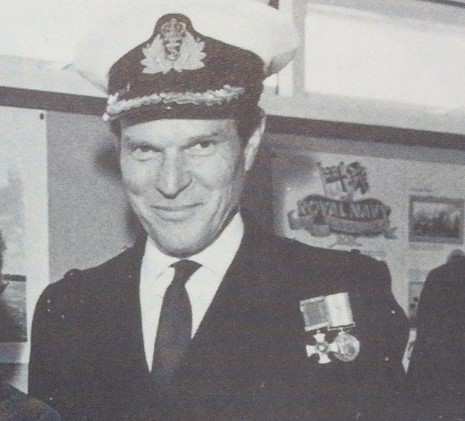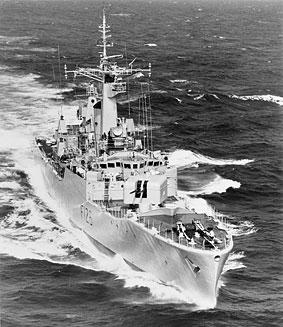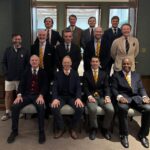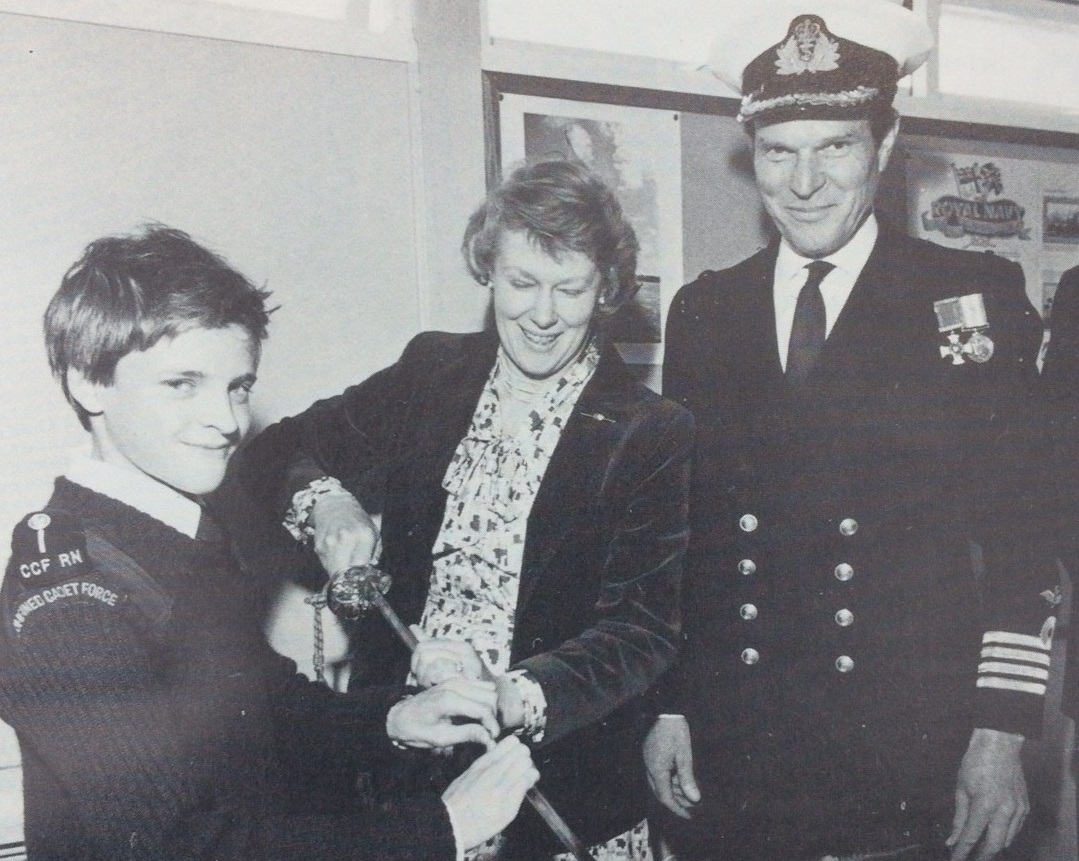The Haileybury Society is saddened to learn of the death of Captain David Pentreath, RN, CBE, DSO (A 46), and a past President of the Society itself, who died aged 86 on the 26th June.
David was born in London on April 9 1933, the son of Rev. Canon Arthur – “Guy” – Pentreath (Th 1916), and whose whose ancestors included Richard Pentreath, an able seaman who fought at Trafalgar.
David Pentreath – Fighter pilot with the Fleet Air Arm
After leaving Haileybury, he joined the Royal Navy in 1951. Serving first as a seaman officer he eventually trained to become a fighter pilot with the Fleet Air Arm and flew Hawker Seahawk and Supermarine Scimitar aircraft; the latter of which had a particularly high accident record. Despite this, he flew the type in the aerobatic team of Cdr Keith Leppard, whose team perfected the technique now known as the “twinkle roll”.
Distinguished naval career

David’s flying career came to an end when he contracted Meniere’s disease so, following ship command exams, he took command of the minesweeper HMS Kemerton in 1964; by 1966 he was first lieutenant of the destroyer HMS Daring. He went on to serve in Hong Kong and Portland and briefly commanded the Rothesay class frigate HMS Brighton in 1973, before studying at the National Defence college and working for the MoD.
David Pentreath and the Falklands War
During the Falklands War in 1982, Pentreath was in command of the Type 12M (modified) Rothesay class frigate, HMS Plymouth, an anti-submarine frigate which played an early, and significant, part in the conflict when it opened fire on Argentine marines occupying Grytviken on the remote British possession of South Georgia. The ship’s Westland Wasp helicopter also helped damage the submarine Santa Fe, rendering it ineffective and unable to dive and causing the vessel to be abandoned.
Following this action, Pentreath, together with Captain Nick Barker of HMS Endurance, witnessed the surrender of the notorious Argentine naval lieutenant Alfredo Astiz – the so-called “Blond Angel of Death” who had played a particularly unpleasant role during the period of state terrorism in Argentina known as the “Dirty War”; when many civilians were murdered and were to become known as “the Disappeared”. Even during his surrender, this displeasing individual wished the surrender document to refer to “invading” British forces; Pentreath, with suitable aplomb, struck out the word before the document was signed.
Bombardment and bomb damage
Equipped with a twin 4.5″ Mk 6 naval gun mounting, Plymouth went on to join the Falklands battle proper; bombarding Argentine positions on the islands. On 8th June 1982, she entered Falkland Sound in support of the main task force and it was here that the vessel came under attack from low level by Mirage fighter-bombers.
Despite skilful manoeuvring, Plymouth was struck by four bombs, none of which – luckily – exploded. The vessel became one of the first ships to enter Port Stanley; Pentreath was subsequently awarded the DSO for his work.
After the Falklands War he became director of the staff course at the Royal Naval College, Greenwich and commodore at HM Naval Base Faslane. He was made CBE in 1987.
David Pentreath had an astonishing bravery and was an extremely inspirational man both in service and in retirement; a passionate sailor, he was an archetypal British naval man in the mould of its greatest heroes.
Haileybury memories
He always remembered Haileybury; indeed he was a member of the Haileybury Society Committee (1988-9) and was, of course, our President from 1993-4. He was in frequent contact with the Society; with typical delight he took great pleasure in telling us about selling a “large boat to a very nice family and we have down-sized to a 28ft Twister class, called Twist Agasson. She sails very well.”
David married Judith Waite in 1963 (shown in the photograph above) who sadly died earlier this year. He is survived by three sons: Ben, Tim (E 77), and Jon (E 79), who carries on the naval tradition as a Rear Admiral, having been Commander, Air, of HMS Ocean and being appointed OBE in 2012 and CB in 2019.
Memorial Service
A memorial service for David Pentreath will be held at Greenwich later this year. We will supply more details in due course.
Note: some of the information in this obituary derives from that in the Daily Telegraph; the rest comprises information in the public record and the Haileybury Society’s own source material
Footnote – HMS Plymouth:

HMS Plymouth was the subject of considerable efforts to preserve her for the nation. Due to be phased out following John Nott’s notorious 1981 Defence White Paper, a document which is widely believed to have contributed to the Falklands War itself, not only did the ship serve with distinction under Pentreath, it went on to serve the Royal Navy until being finally paid off in 1988.
Acquired by the Warship Preservation Trust in 1989 with a view to preserving it as a museum, this eventually did not come about and she was scrapped in Turkey in 2014. An ignoble end to such a fine vessel.
Recently, supporters of HMS Plymouth have attempted to have one of the new Type 26 Frigates named after her; this too fell on deaf ears.
It is hoped that it will not be too long before the name of Plymouth once more graces a vessel of the fleet, further reinforcing the name of David Pentreath in the great annals of British naval officers.
About the photograph
The delightful photograph at the head of this article is taken from Haileybury 1806-1987 by Imogen Thomas.
The original photograph was published courtesy of Stephen Austin Newspapers Ltd; David Pentreath wears the DSO he was awarded for his part in the Falklands Campaign.
More from The Haileybury Society
- EGRE – international Boutique Real estate Agency

- Running In Memory: Annabelle Smith (M 22) Takes on the Cambridge Half for Mind

- HYT Uganda Update: A Lanmark Year of Groth, Innovation, and Impact

- £500 Travel Grant Awarded for Clinical Placement in Peru – Emily Jacobs (M13)

- World Champions & OHs Take to the Court at Queen’s

- Design, Politics and Discovery: A Solo Journey Across Europe

Unless otherwise stated, all content and images on this website and blog © The Haileybury Society, 2024, all rights reserved
Search stories by date
| M | T | W | T | F | S | S |
|---|---|---|---|---|---|---|
| 1 | 2 | 3 | 4 | 5 | 6 | 7 |
| 8 | 9 | 10 | 11 | 12 | 13 | 14 |
| 15 | 16 | 17 | 18 | 19 | 20 | 21 |
| 22 | 23 | 24 | 25 | 26 | 27 | 28 |
| 29 | 30 | 31 | ||||
Unless otherwise stated, all content and images on this website and blog © The Haileybury Society, 2024, all rights reserved
